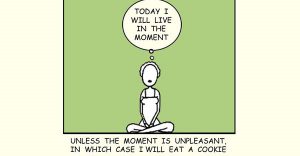 Emotional eating is defined as eating triggered by something other than physiological hunger. At some point in our lives, most of us experience this.
Emotional eating is defined as eating triggered by something other than physiological hunger. At some point in our lives, most of us experience this.
Sometimes it is in response to stress, sometimes it is to evoke a happy memory – everyone understands the phrase “comfort food”. For some, however, emotional eating can become a daily practice and wreak havoc with both weight and health, particularly as most “comfort foods” are carbohydrate and calorie-dense but low in nutrients – aka, junk food (I’m talking about you: pasta, cookies, chips etc.).
There can be a physiological trigger involved in emotional eating. For example, when the body is under stress, it releases the hormone cortisol in activating the “fight or flight” response to deal with the perceived threat. One of its roles is to quickly increase blood sugar to supply the body with the energy it needs for this (hence the craving for refined carbohydrates, which are very quickly converted to glucose in the body). When a person experiences long term stress due to issues at work or with family, however, it can lead to chronically elevated levels of cortisol and may contribute to the development of emotional eating patterns. Sometimes emotional eating is more about filling an emotional void or evoking a happy memory (for example, when my mother died I craved the birthday cake she made me every year) and often we view some less-than-healthy food “treats” as rewards, especially if we were brought up this way. Rarely is emotional eating simply an issue of lack of self-discipline around food. So, the bottom line is: to curb emotional eating, you first have to find out what’s eating you.
One of the best ways to do this is to keep a food diary. Keep a record of not only what you eat, but when, and how much and how you felt before and after eating your meal. Over time, you will see patterns develop and once you become aware of what triggers you and why, you are halfway there to curbing emotional eating.
To reach the finish line, you need to find healthier alternatives to allay your emotions and ultimately you must resolve the true underlying need. It might be easier to substitute healthier food options at first (perhaps have dried plantain or kale chips or popcorn instead of regular potato chips…and be sure you don’t have your usual junk foods of choice around the house). You might even try waiting 10 minutes or so to see if the craving passes. Later, see if there is a non-food alternative that fulfills the void, such as a walk in the park, listening to your favourite music, reading a fantastic novel or calling a friend. Write down your list of alternatives so the ideas are readily at hand when the urge to eat emotionally strikes. But if you have a setback and binge out on some junk food, don’t berate yourself as that just adds to stress and emotional overload. Accept it, learn what you can from why it happened and how you might prevent it happening next time, and move on.
Reducing stress is pivotal to curbing emotional eating. Moderate exercise and practices such as yoga, tai chi and daily meditation are invaluable in this regard. Finally, you don’t want to let yourself get too tired or too hungry as this will make you more vulnerable to a bout of emotional eating. Take frequent short breaks throughout the day, don’t over-schedule yourself and make sure you are getting adequate nightly rest. Eating a healthy, varied and balanced diet of nutrient-dense whole foods is an excellent way to keep blood sugar levels steady, minimizing cortisol release. Talk to your health care practitioner about diet and lifestyle changes that will help you manage stress and kick emotional eating to the curb!